Table of Contents
Forskolin (Coleus forskohlii) is the only known supplement to naturally boost cAMP (Cyclic Adenosine Monophosphate) in your brain. cAMP is important for neural signaling within brain cells.
As a secondary messenger in neurons, cAMP produces proteins needed for neuron and synapse growth. This process is called Long-Term Potentiation (LTP).
LTP is the process where synaptic connections get stronger in response to electrical stimulation in the brain. This process happens naturally through life experience. It’s a critical part of synaptic plasticity. And how experience is recorded through learning and memory.
Forskolin is a chemical compound extracted from Coleus forskohlii (Plectranthus barbatus), a perennial plant native to India, Burma and Thailand.
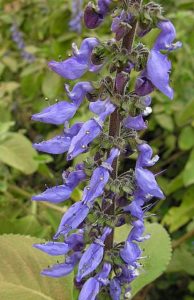
Forskolin is used in Western homeopathic medicine to treat allergies, skin conditions, obesity, PMS, irritable bower syndrome, urinary tract infections, bladder infections, cancer, blood clots, male infertility, insomnia and convulsions.
Some healthcare providers even use Forskolin intravenously (IV) for heart failure.
Here we’re going to explore how Forskolin benefits your brain.
Forskolin helps:
- Neural signaling: Forskolin activates the enzyme adenylate cyclase which increases cAMP (Cyclic Adenosine Monophosphate) levels in brain cells. cAMP is a signal carrier required for intracellular communication. Increasing cAMP levels helps boost cognition, long-term memory, and alertness.
- Cerebral Circulation: Forskolin works as a vasodilator which increases blood flow in your brain. Improved blood flow increases nutrient and oxygen delivery to brain cells.
- Brain-Derived Neurotrophic Factor (BDNF): Forskolin stimulates the TRKb receptor which helps potentiate BDNF. Both cAMP and BDNF can activate mitogen-activated protein kinase (MAPK/ERK) which plays a role in long-term potentiation (LTP).[ii] LTP helps create long-term memory.
What is Forskolin?
Forskolin is a chemical compound found in the Coleus forskohlii plant, a member of the mint family which grows as a perennial on the plains of India and lower Himalayas.
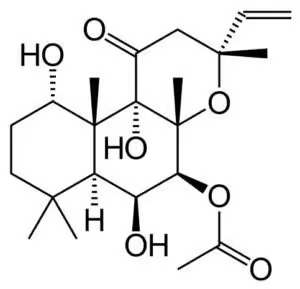
Coleus forskohlii was used in traditional Ayurvedic medicine to improve mood and for general health and wellness. As folk medicine, the herb was used to treat central nervous system disorders, problems of the heart, lung function, skin and gastrointestinal issues.
Researchers and holistic medical practitioners use the extract Forskolin to boost cerebral blood flow, lower blood pressure, treat hypertension, asthma and congestive heart failure.
As a nootropic, Forskolin is the only known supplement to naturally raise cAMP levels. Forskolin activates the enzyme adenylate cyclase which increases intracellular levels of cAMP (Cyclic Adenosine Monophosphate).[iii]
cAMP was discovered in 1956 and its production is now known to be the final common pathway for many hormones and transmitter agents.
To put this in practical perspective, hormones and neurotransmitters do not enter the cell. Instead, they activate a receptor on the cell membrane that is part of the adenylate cyclase enzyme complex.
The production of cAMP in a cell is catalyzed by this complex. The cyclic AMP (cAMP) then activates cAMP dependent protein kinase (PKA), which results in changes in the cell’s function.[iv] Based on input from the relevant hormone or neurotransmitter.
The elevation of cAMP along with PKA is required for long-term potentiation (LTP). This increase in neuroplasticity is how long-term memories are formed and encoded in your brain.
Researchers have found that increases in cAMP rapidly activates the Brain-Derived Neurotrophic Factor (BDNF) receptor TrkB and induces BDNF-dependent long-term potentiation at the Schaffer collateral-CA1 synapse in the hippocampus.[v]
In simpler terms, Forskolin boosts cAMP levels which affects long-term potentiation (LTP). LTP is an integral part of the process in developing and encoding long-term memories.
How does Forskolin work in your Brain?
Forskolin boosts brain health and function in several ways. But two in particular stand out.
- Forskolin enhances memory. Forskolin as a nootropic has the unique ability to activate the enzyme adenylate cyclase (AC). The activated AC enzyme then converts to cAMP (Cyclic Adenosine Monophosphate), a secondary messenger used for intracellular communication.[vi]
cAMP helps stimulate the production of CREB (cAMP response element-binding protein). An increase in CREB enhances Long-Term Potentiation (LTP).
LTP is the connection between brain synapses. Strengthening in response to stimulation by neurons on either side. A major component in both learning and memory.
Memories are stored at a cellular level. And retrieved at a cellular level. This well-travelled pathway is strengthened by boosting cAMP with Forskolin.[vii]
- Forskolin increases cerebral circulation. Coleus forskohlii has traditionally been used to treat hypertension (high blood pressure), congestive heart failure and angina (reduced blood flow to the heart).
Forskolin is very effective in lowering blood pressure. And scientists believe this ability to boost blood flow is related to Forskolin’s cAMP-elevating ability.
Researchers recruited 7 patients with dilated cardiomyopathy (DCM). DCM is a condition in which the heart’s ability to pump blood is decreased due to the left heart ventricle being enlarged and weakened. Forskolin administration dramatically improved left ventricle function. And increased overall cardiovascular performance.[viii]
Another group of scientists set out to study the effects of Forskolin on cerebral circulation. In this study, rabbits were anesthetized and measuring devices were attached to blood vessels entering and coming out of the brain.
The study found that Forskolin was an effective cerebral vasodilator. Enlarging blood vessels in the brain boosted blood flow. Allowing for more efficient delivery of nutrients and oxygen to brain cells.[ix]
How things go bad
Environmental factors like the food we eat, exposure to toxins, polluted air, ADHD, illness, stress and aging changes our brain chemistry.
↓ Mood and motivation declines
↓ Memory and recall decline
↓ Long-term memory fades
All of these changes are contributing factors to poor quality of life. And as they progress, to neurodegenerative diseases like Alzheimer’s, dementia and Parkinson’s.
Forskolin benefits
Research from hundreds of studies, and feedback from neurohackers have shown that Forskolin can:
- Improve memory by boosting cAMP activity in the brain
- Boost catecholamines (dopamine, norepinephrine, and epinephrine) in the brain
- Boost cerebral circulation
Forskolin is fat-soluble and quickly enters your brain after you take it. Once in your brain, it boosts cAMP activity. cAMP is involved in the Long-Term Potentiation process of preserving memories.
Forskolin combined with Artichoke extract is even more effective. Forskolin effectively boosts cAMP levels but also increases PDE4 in the brain. PDE4 is a cAMP inhibitor and will counteract increases by Forskolin if left unchecked.
Inhibiting PDE4 with Artichoke Extract, and boosting cAMP with Forskolin also potentiates dopamine release in the brain. Boosting processes in this stream of chemical reactions in the brain increases learning and memory.[x] Without the side effects of stimulating dopamine production through the use of drugs like Adderall or Ritalin.
How does Forskolin feel?
Many neurohackers report that Forskolin with Artichoke Extract improves mood. It motivates you to want to learn, and to get things done. Some say it works as good as Modafinil.
The general consensus is:
- Improved long-term memory
- Increased ability to retain information
- Increased ability to study
- Improved mood and motivation
Forskolin Clinical Research
Forskolin as a nootropic
cAMP responsive element binding protein (CREB) is a protein that modulates the transcription of genes. Increases in cAMP triggers the activation of CREB.
And this transcription factor is a big part of intracellular signaling. It regulates everything from the production of new sperm cells in men (spermatogenesis), to the circadian rhythms that control your sleep and awake cycles, to memory formation.
Forskolin increases cAMP which triggers the activation of CREB. Researchers have found through animal studies that CREB is required for a variety of complex forms of memory, including spatial memory and social learning.[xi]
Forskolin reduces anxiety
Benzodiazepines (Benzos) like Valium are a class of psychoactive drug used to treat anxiety, insomnia, agitation, muscle spasms, alcohol withdrawal and before medical and dental procedures to keep the patient calm.
Benzodiazepines come with a whole host of negative side effects including addiction, cognitive impairment, decreasing effectiveness (tolerance) and nasty withdrawal symptoms.
Scientists have been studying non-GABAergic substances that elevate cAMP, and have anti-anxiety activity. So they took a look at Forskolin.
In one animal study, researchers compared the effects on anxiety of Forskolin compared to diazepam (Valium). And found that Forskolin produced significant anti-anxiety activity in both stressed and unstressed animals.
Diazepam had an anti-anxiety effect on the unstressed animals. But did not work for stressed animals. The researchers noted that the anti-anxiety activity of Forskolin was accompanied by a significant elevation of cAMP levels. There’s cAMP again…
The researchers concluded that Forskolin was a better option for treating anxiety. This non-receptor mediated anti-anxiety action through cAMP elevation was preferable to the adverse reactions people get from using receptor-mediated drugs like Benzos.[xii]
Forskolin as a neuroprotectant in chemical warfare
If you ever find yourself in a warzone, you may want to have a bottle of Forskolin with you.
Acetylcholinesterase (AChE) is the primary cholinesterase in your body. This enzyme catalyzes the breakdown of acetylcholine (ACh) once ACh is used in the synaptic cleft during neurotransmission. This is how it works…
During neurotransmission, ACh is released from the first neuron into the synaptic cleft of the 2nd neuron where it binds to ACh receptors. And does its job of passing on the neural signal.
Once ACh has done its job, AChE which is also located in that synaptic cleft, steps in and breaks down acetylcholine (ACh) by liberating the choline. The liberated choline is taken up again by another neuron, and ACh is synthesized by combining the free recycled choline with Acetyl-CoA through the action of choline acetyltransferase.
Chemical warfare agents like Sarin gas, and insecticides like malathion, act to inhibit AChE. Which means they shut down this recycling process needed for acetylcholine production in the brain.
Researchers have demonstrated that Forskolin is a very effective AChE promoter. Forskolin activates AChE and up-regulates its expression. Using mouse models, the scientists showed that Forskolin boosted AChE expression outside and inside the affected brain cells.
They concluded that Forskolin can sufficiently upregulate cellular AChE production and protect cells against chemical warfare agents like Sarin.[xiii]
Forskolin works to protect your brain from damage caused by insecticides too. So if your using an insecticide in the house or out in your garden, you may want to protect your brain by dosing with Forskolin first.
Forskolin Recommended Dosage
Recommended dosage for Forskolin is 250 mg of Coleus forskohlii at 10%, or 125 mg of Coleus forskohlii at 25%.
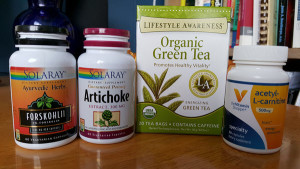
For boosting cAMP in a CILTEP stack: 4 mg Forskolin extract per day along with 900 mg of Artichoke Extract for PDE4 suppression.
NOTE: You will not get the full nootropic benefit of using Forskolin if you use it on its own. Forskolin has a tendency to boost cAMP and PDE4 levels. And PDE4 suppresses cAMP. Artichoke Extract helps control PDE4.
And don’t worry about measuring out an accurate 4 mg for this CILTEP stack. I’ve been using 250 mg of Forskolin (10% ForsLean®) with 900 mg of Artichoke Extract (6%) with great success.
For counteracting Forskolin’s effect on Acetylcholinesterase: 800 mg Acetyl-L-Carnitine (ALCAR) – (500 mg of ALCAR twice per day.
Many users of this stack report it helpful to supplement with 500 mg Phenylalanine, a B-Vitamin Complex and caffeine (coffee or preferably green tea).
Forskolin Side Effects
Forskolin induces CYP3A gene expression in your liver. Which means, like grapefruit juice, Forskolin needs to be used cautiously as it will amplify the effects of other nootropics in your stack. And prescription meds.[xiv]
Acetylcholinesterase is upregulated by cAMP which makes you sleepy. This means that available Acetylcholine (ACh) in your brain drops. You can counteract this by supplementing with Acetyl-l-Carnitine (ALCAR), which reduces the upregulation of Acetylcholinesterase.
The most common side effect with Forskolin is diarrhea because increased cAMP affects the smooth muscle in your gastrointestinal tract. Things move through your intestines faster with Forskolin. But this side effect usually happens at much higher than recommended doses of Forskolin.
Forskolin also reduces blood pressure. So if you’re on high blood pressure meds or have naturally low blood pressure you should avoid using Forskolin.
Type of Forskolin to Buy
Forskolin is usually marked as “Forskolin” or “Coleus forskohlii” on the bottle.
Forskolin typically comes in 125 mg capsules of Coleus Forskohlii (25% Forskolin), or 250 mg capsules of Coleus Forskohlii (10% Forskolin).
Look for a Coleus forskohlii or Forskolin supplement with the percentage of Forskolin extract clearly marked on the label.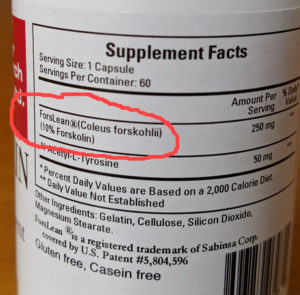
ForsLean® by Sabinsa Corporation is a branded and patented form of Coleus forskohlii that’s been used most often in human trials. So we prefer a supplement that uses ForsLean® as their source of Forskolin.
Researchers in India reported that Forskolin concentration can change significantly depending on where the Coleus forskohlii is grown.[xv] And why we prefer a standardized version like ForsLean®.
Nootropics Expert Recommendation
Forskolin Extract 125 – 250 mg per day
 I recommend using Forskolin as a nootropic supplement.
I recommend using Forskolin as a nootropic supplement.
Your body does not make Forskolin on its own. So to get its benefits you must take it as a standardized supplement.
Forskolin on its own as a supplement for cognition and memory is not very effective because it increases PDE4 (a cAMP reducer) along with boosting cAMP. So the nootropic effects cancel each other out.
But Forskolin is especially helpful when combined with Artichoke Extract. It helps boost memory, increases motivation and the desire to learn. And helps improve mood while controlling anxiety.
We suggest dosing Forskolin 125 – 250 mg per day with 900 mg of Artichoke Extract taken in the morning. Stack this with at least 800 mg of ALCAR to keep your acetylcholine levels up.
We’ve also found that combining this stack with caffeine is helpful. The L-Theanine in green tea comes with the caffeine boost we need. Without the side effects of coffee.
And finally, we are making the effects of normal dopamine function more effective with this stack. It triggers the desirable downstream processes that increase learning and memory.
The chemical dynamics of the dopamine are preserved. And we don’t get the negative side effects of using a stimulant like Adderall or Ritalin.
This Forskolin/Artichoke Extract stack increases mental endurance for encoding long-term memories.

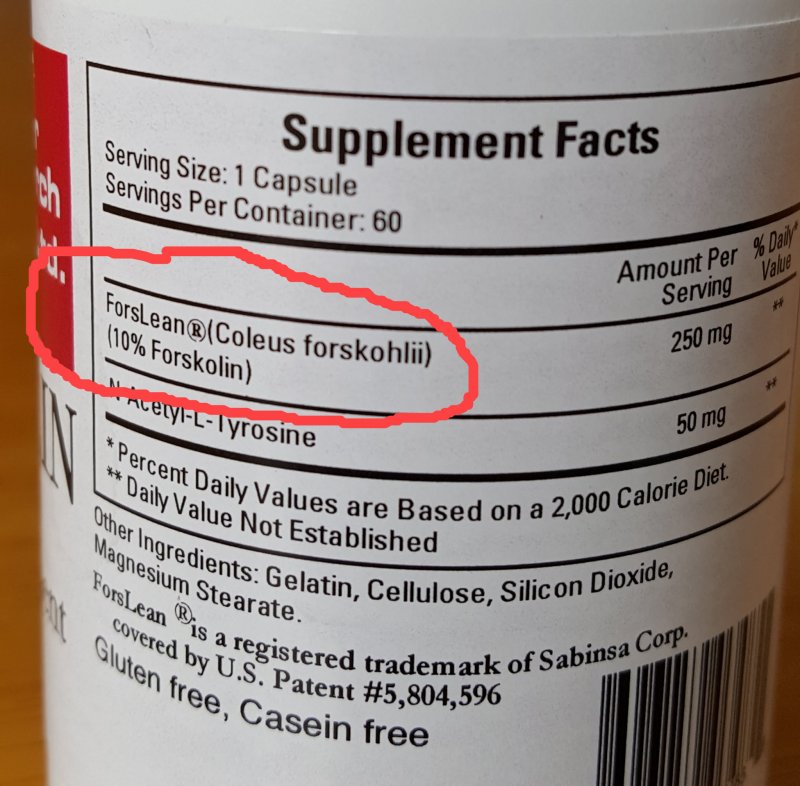
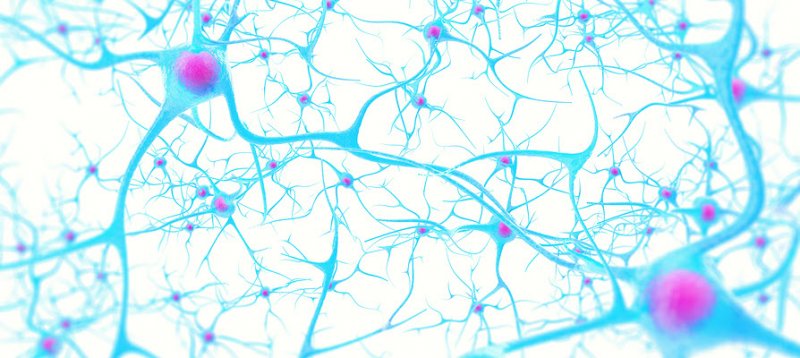





Join The Discussion - 112 comments
Janna
August 31, 2023
Does forskolin help with narcolepsy type 2? If so, do I need Artichoke extract and when do you recommend taking?
Thank you in advance!
David Tomen
September 13, 2023
It does not help with narcolepsy. This study (https://www.ncbi.nlm.nih.gov/pmc/articles/PMC2104495/) shows Forskolin was able to restore long-term potentiation needed to form long-term memory that was degraded from the use of Modafinil which is used to treat narcolepsy.
No Bonk
July 23, 2023
Whenever I take a capsule of Forslean or Forslean + artichoke extract my libido dies (worse with the latter). I am also very pale when I wasn’t a few years ago, and have ED. Any ideas on what is happening when I take the supplements? Thanks alot
David Tomen
July 25, 2023
Artichoke extract (Luteolin) is a progesterone inhibitor which is going to have a negative effect on testosterone and libido. https://www.ncbi.nlm.nih.gov/pmc/articles/PMC3851288/
niki
January 1, 2023
hi,
What is an alternative to stacking with Artichoke if I’m allergic to ragweed and artichoke is a member of the ragweed family.
Any other suggestions for stacking with Forskolin to enhance it’s benefits?
I take forskolin 10% right now, 200mg. I love it but i’m intrigued by the artichoke addition and how it can enhance the effects.
Thx.
David Tomen
January 10, 2023
Niki, do a search for “best natural pde4 inhibitors” and see what turns up. I believe there are some in Chinese Medicine.
Chris
December 27, 2022
Great article thanks.
What ForsLean powder do you recommend?
Thank you
David Tomen
December 28, 2022
Chris, this one: https://geni.us/rtm1 (Amazon)
Froukje
November 8, 2022
Hello, I don’t know if this link is still active enough but i really hope so, because I have a question. I know that forskolin stimulates CAMP production. I also know that it tends to reduce anxiety complaints (don’t understand how, really). And what I also know is that in people with migraines, CAMP levels are typically elevated. So …. how about when you have migraines or cluster headache, is forskolin contra-indicated?
David Tomen
November 9, 2022
Froukje, unless I am reading this wrong, this study (https://pubmed.ncbi.nlm.nih.gov/11298662/) shows that the benefits of Forskolin on cAMP is not experienced in those with cluster headaches. Correct me if I am wrong please.
James
September 1, 2022
Hi Dave,
Given that you say that Forskolin “boosts catecholamines (dopamine, norepinephrine, and epinephrine) in the brain” without the side effects of ADHD stimulants, and makes the effects of normal dopamine function more effective”…. would Forskolin be an effective nootropic to take alongside ADHD stimulant meds?
I also saw that you said that “Forskolin induces CYP3A gene expression in your liver” and was similar to grapefruit juice in this regard. I know that grapefruit juice can have quite the negative impact on ADHD stimulant meds so would that mean it would likely have a similar detrimental impact?
Would taking it towards the end of your ADHD stimulant meds duration be a wiser idea?
Thanks 🙂
David Tomen
September 3, 2022
James, Forskolin potentiates dopamine release in the brain so will likely potentiate ADHD stimulants. That would be a bigger factor than how it induces CYP3A. I’ve not heard of anyone using Forskolin like this and it’s likely because it’ll throw off how stimulants work. If you already have a stack support ADHD and stimulant use then I’d forget about using Forskolin. No reason to complicate things.
Jack Simmons
March 17, 2022
Would it be okay to stack CDP-Choline with Forskolin? Or would this increase acetylcholine too much?
Thank you for all your research, David! This has helped me so so much! You’re the first place I go when I’m looking for information on nootropics.
David Tomen
March 18, 2022
Jack, Forskolin may potentiate the effects of CDP-Choline but only you will be able to tell if it potentiates it too much. You’ll find out through testing.
I suggest adding ALCAR to your stack if you haven’t already because you need it as a cofactor in acetylcholine synthesis. Along with thiamine and Vitamin B5. So a good bioactive B-Complex will help as well.
Tom
January 9, 2022
Have you heard of 9-ME-BC and Bromantane to help heal dopamine receptors?
David Tomen
January 11, 2022
Tom, I have not. If you have any peer-reviewed clinical studies that explain and prove how they help the human brain please respond here with links to those studies and I’ll take a look.